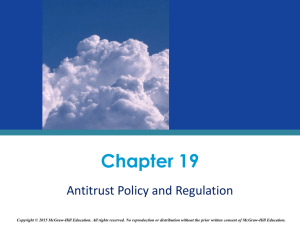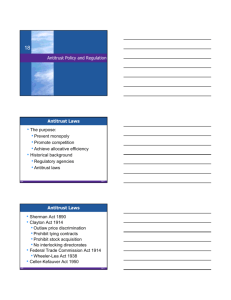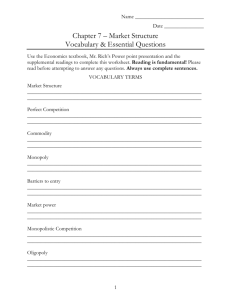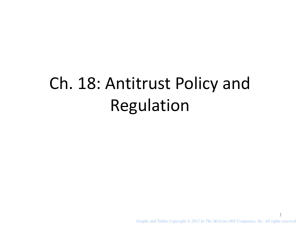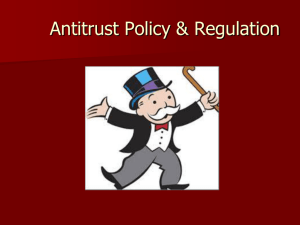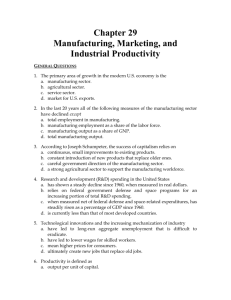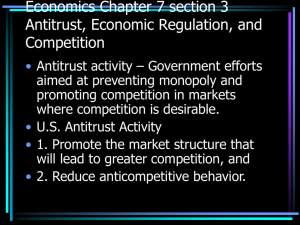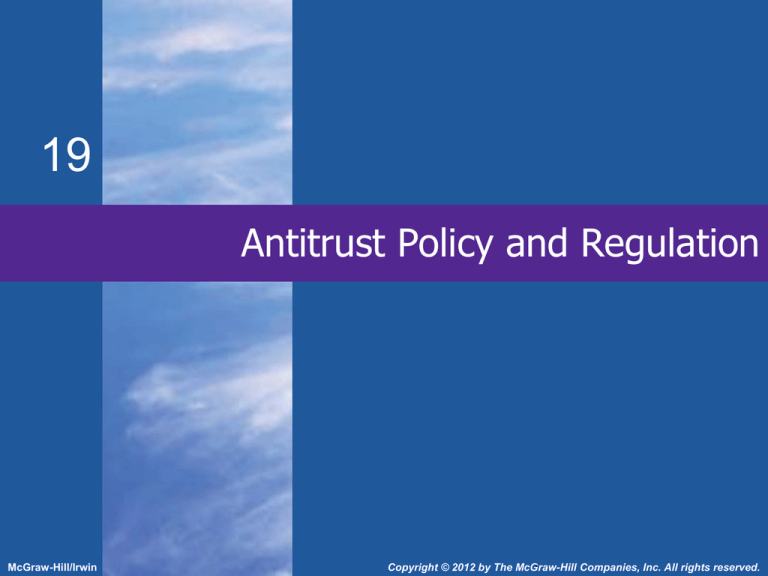
19
Antitrust Policy and Regulation
McGraw-Hill/Irwin
.
Copyright © 2012 by The McGraw-Hill
Companies, Inc. All rights reserved.
Antitrust Laws
• The purpose:
• Prevent monopoly
• Promote competition
• Achieve allocative efficiency
• Historical background
• Regulatory agencies
• Antitrust laws
LO1
Antitrust Laws
• Sherman Act 1890
• Made restraint of trade and
monopolization illegal
• Injured firms can sue for treble
damages
• Department of Justice or injured
firms can initiate suits
LO1
Antitrust Laws
• Clayton Act 1914 – Illegal if
competition is reduced
• Outlaw price discrimination
• Prohibit tying contracts
• Prohibit stock acquisition
• No interlocking directorates
LO1
Antitrust Laws
• Federal Trade Commission Act 1914
• Power to investigate unfair
business practices of firms
• Cease and desist orders
• Wheeler-Lea Act 1938
• Made fraudulent advertising
illegal
• FTC investigates fraudulent
advertising
LO1
Antitrust Laws
• Celler-Kefauver Act 1950
• Made all mergers illegal if
competition is significantly reduced
LO1
Antitrust Policy
• Issues of interpretation
• Monopoly behavior or structure
• 1911 Standard Oil Case
• 1920 U.S. Steel Case
• Rule of reason
• 1945 Alcoa Case
• The relevant market
• 90-60-30 rule
• 1956 DuPont Cellophane Case
LO2
• Issues of enforcement
Antitrust Policy
• Issues of enforcement
• Active antitrust perspective
• Laissez-faire perspective
LO2
Effectiveness of Antitrust Laws
• Monopoly
• AT&T
• Microsoft Case
• Mergers
• Horizontal merger
• Vertical merger
• Conglomerate merger
LO2
Mergers
• Price fixing
• Per se violation
• Price discrimination
• Tying contracts
LO2
Industrial Regulation
• Natural monopolies
• Economies of scale
• Public interest theory of regulation
• When it’s beneficial to have a single firm
price and output must be regulated by
government to prevent abuse of power
LO3
Problems with Industrial Regulation
• Costs and inefficiency
• No incentive to reduce cost
• X-inefficiency
• Perpetuate monopoly
• Legal Cartel Theory
• Regulating potentially competitive
industries
• Firms desire regulation
LO3
Deregulation
• Began in the 1970s
• Has produced large net benefits for
•
LO3
consumers and society
Industries deregulated include:
• Airlines
• Railroads
• Telecommunications
• Electricity
Social Regulation
• Concerned with the conditions under
•
•
•
LO4
which goods and services are
produced
Impact of production on society
Physical qualities of goods
Applied “across the board” to all
industries
Social Regulation
LO4
Social Regulation
• Optimal level of social regulation
• In support of social regulation
• Criticisms of social regulation
• High costs, higher prices
• Uneconomical goals MB<MC,
overzealous personnel
• Inadequate information
• Unintended side effects
• Slower innovation
• Reduced competition
LO4

